The Iranian Canadian Congress (ICC) has been embroiled in a legal dispute for two years.
That dispute will come to a head at the ICC’s Annual General Meeting (AGM) on December 13, 2020, when ICC members will choose between two competing slates of board candidates. One slate supports the existing political orientation of the ICC, while the other slate opposes the ICC’s current political orientation.
Recently, four ICC members asked an Ontario Court to replace the current board on an urgent and interim basis. On November 2, 2020, the Court rejected their request.
Shortly after the Court rendered that decision, several members of the ICC, including ICC President Soudeh Ghasemi, sought a meeting with me. I had previously met with them to hear about the ICC’s work against sanctions and military intervention targeting Iran.
Based on my many interactions with Soudeh and her ICC colleagues, I have found them all to be committed to peace, justice and human rights for the Iranian people. They oppose the sanctions currently imposed on Iran, as well as efforts to undermine the current Iranian regime by military intervention, because those sanctions have inflicted vast suffering on innocent Iranians and because a war would almost certainly inflict far greater suffering.
Indeed, earlier this year, the U.N. Secretary General called for the easing of sanctions on Iran and other states because those sanctions are heightening the health risks for millions of Iranians and are weakening the global effort to contain the spread of coronavirus.
As the U.N. Secretary General stated, “this is the time for solidarity not exclusion.”
In our meeting in early November, Soudeh asked me to encourage other peace activists to support the pro-peace team at the ICC.
Soudeh and her colleagues also advised me that many of those who oppose the current ICC Board support sanctions on Iran, have a right-wing agenda, and are sympathetic to the MEK.
The MEK is an Iranian opposition group that was previously listed as a terrorist entity in Canada, before Stephen Harper’s government dropped the group from the list in 2012. The MEK has officially renounced political violence, but now works closely with hardliners in the White House and the Canadian government.
In my meeting with ICC members in early November, I asked them whether the ICC’s membership was limited to persons of Iranian origin. They said that, according to the ICC bylaws, membership was open to all persons residing in Canada, irrespective of their race or country of origin.
The by-laws of the ICC explicitly prohibit the organization from rejecting membership applications on the basis of ethnicity or religion. Article 15, Section 1 of the ICC By-laws states:
“The ICC membership shall be open to every person who agrees with the ICC by-laws and supports the aims and objectives of the ICC. To this end all individuals aged 14 and over shall be eligible for membership without discrimination based on race, nationality or ethnic origin, color, religion, sex, sexual orientation, age or physical disability, if they are residing in Canada.“
Shortly after my meeting with Soudeh and her colleagues, I applied for membership in the ICC.
Since then, I have learned that the campaign opposing the current ICC board has also signed up individuals who are not of Iranian origin.
After joining the ICC, I sent an email to fewer than 20 peace activists in Canada with whom I have worked extensively. In my email, I summarized the information I had received from Soudeh and I urged my fellow activists to join the ICC and to support the current Board at the upcoming AGM.
My email was not intended for publication or mass distribution, but someone provided that email to Postmedia columnist Terry Glavin. Without providing to me a reasonable opportunity to explain my actions or my position, the National Post and the Ottawa Citizen published my email in a column by Mr. Glavin, and did so without my consent.
The publication of my email prompted Soudeh to write a letter to the Ottawa Citizen, which did not publish her letter. (A copy of Soudeh’s letter appears at the end of this article.)
The publication of my email elicited a strong reaction from some members of the Iranian-Canadian community who are opposed to the current ICC Board. I have since spoken with several of them, including two of the board candidates who oppose the current ICC Board. Those conversations have been enlightening for me.
It is now clear to me that my email could be interpreted as an assertion that all those who oppose the current ICC Board embrace a right-wing agenda and support efforts to overthrow the current Iranian regime through broad, punishing sanctions and military intervention.
I have learned, however, that the persons who oppose the current ICC board have diverse political perspectives and diverse views on Canada’s relations with the government of Iran.
Some opponents of the current ICC Board are, in fact, progressive. Like the current ICC Board, they do not support the sanctions regime or military intervention, precisely because of the suffering this has caused and could cause to innocent Iranians.
On the other hand, it is also true that some opponents of the current ICC Board have a decidedly right-wing perspective. For example, one of the board candidates who opposes the current ICC Board is a monarchist – a fact that was confirmed to me by two of the board candidates who oppose the current Board. That monarchist has also supported sanctions against Iran. Another board candidate who opposes the current ICC board has been an outspoken advocate for Israel, going so far as to defend Israel as its military rained bombs down on Gaza in 2014, killing over 500 Palestinian children.
What do these politically diverse opponents of the current ICC board have in common? Based on my interactions with them, I believe them to be united in their belief that the ICC should confine itself to issues of a purely domestic nature and should not take positions on Canada’s foreign policy toward Iran’s government.
Respectfully, I disagree with their position: I believe that the ICC should continue to advocate against military intervention and against sanctions that cause hardship to innocent Iranians.
In my view, the people of Iran have suffered enough as a result of foreign intervention in Iran’s internal affairs.
In the 1950s, the U.K. and U.S. governments engineered a coup to remove from power the democratically elected Iranian Prime Minister Mohammad Mosaddegh after he sought to nationalize the Anglo-Persian Oil Company (later known as British Petroleum) for the benefit of the Iranian people.
Mr. Mosaddegh was supplanted by the notoriously corrupt, U.S.-backed Shah of Iran, who brutalized the Iranian people until he was overthrown in 1979.
The Shah was supplanted by Iran’s current, theocratic regime. Today, it is widely understood that the rise of Iran’s theocracy was “blowback” from the West’s destruction of Iranian democracy in the 1950s.
Shortly after the Iranian revolution, Saddam Hussein launched a devastating war on Iran, hoping to exploit Iran’s post-revolutionary chaos. From the outset of the war, Western governments supported Saddam. In 1988, U.S. officials gave Saddam’s army details about the whereabouts of Iranian forces, knowing that Saddam would deploy chemical weapons against them. That appalling war ultimately resulted in the deaths of an estimated one million Iranians.
Since the Iraq-Iran war ended in 1988, the U.S. and its allies have launched cyberattacks and waged economic warfare on Iran, which the Trump administration intensified during the pandemic. Moreover, and in flagrant violation of international law, Israel and the United States have engaged in targeted assassinations of Iranian scientists and military personnel, culminating only days ago in the murder of Iran’s top nuclear scientist.
War hawks in Israel and the United States – both of which possess abundant nuclear weapons — claim that Iran continues to develop a nuclear bomb, yet the CIA confirmed over a decade ago that Iran halted its nuclear weapons program in 2003. More recently, just before the Trump administration withdrew from the Obama-era nuclear deal with Iran and re-imposed crushing sanctions on the country, the International Atomic Energy Agency confirmed that Iran was in compliance with the deal.
As the United States and its allies have waged a multi-faceted war on Iran, the country’s theocratic regime has subjected the Iranian people to severe repression and, like other governments around the world, has pursued neoliberal policies, the harsh effects of which have been exacerbated by the regime’s corruption and mismanagement.
After decades of war, repression, corruption and sanctions, the Iranian people have been traumatized.
I believe that the Canadian government – a government which purports to speak in my name – is complicit in their trauma. By allying itself with the U.S., Israel and Saudi Arabia (all of which are severe human rights abusers), Canada’s government has facilitated the West’s multi-faceted war on Iran.
As a citizen of Canada, I have the opportunity to influence the actions of Canada’s government in ways that I cannot influence the actions of other states. I therefore consider it my duty to oppose further aggression against Iran by Canada and its allies and to advocate for a peaceful and humane path toward democracy in Iran.
In joining the ICC and in urging a few of my fellow peace activists to join with me, my purpose was not to ‘interfere’ in matters of concern to the Iranian-Canadian community. Rather, I joined the ICC and urged others to do so as an act of solidarity with members of the Iranian-Canadian community who requested my support and who seek, as I do, peace, prosperity and self-determination for the Iranian people.
******************************
[Letter from Soudeh Ghasemi to the Ottawa Citizen]
To: Editor of the Ottawa Citizen:
I am sending you this email regarding the report published by Mr. Terry Glavin on November 18th, 2020 about Mr. Dimitri Lascaris and the Iranian Canadian Congress. I ask that you publish this email as a response in full.
As you know, there is currently an election campaign for the board of directors of the Iranian Canadian Congress (ICC). I understand that you have asked Mr. Lascaris why he has encouraged his network to support the ICC. I would like to confirm that I asked Mr. Lascaris for help in this election. My intention was to reach out to progressive voices in Mr. Lascaris network, in particular Iranian-Canadian progressives. Based on the list of members that I received on November 17, 2020, from members who joined from the email that Mr. Lascaris sent, only 14 (fourteen) people have non-Persian names. Therefore, there was no mass recruitment of non-Iranians by Mr. Lascaris. That’s an absolutely false claim.
The organization at this stage has over 2500 members across Canada. Overall I could identify close to 60 non-Iranian names in the list of over 2500 people. From the ones I could identify, these members do not necessarily belong to one particular election campaign. There are some non-Iranian names who support the current ICC priorities and there are some who oppose it. ICC has a democratic election process and all people who meet the requirements of the bylaws have the right to vote regardless of their opinion or regardless of which campaign they support.
It is important to note that this is not the first time that ICC has non-Iranian names in its membership. I am aware of the history and details of the organization at least since 2014 and I am aware that there have always been a small number of people who are not from the Iranian background, who are interested in the work and the mission of the ICC, who have joined the organization as members or even as volunteers. Further, as the ICC is a Canadian-based organization first, the ICC does not deny membership to anyone who wishes to join, irrespective of their cultural or ideological backgrounds.
According to the bylaws of the ICC (Article 15, Section 1):
– The ICC membership shall be open to every person who agrees with the ICC by-laws and supports the aims and objectives of the ICC.
– All individuals aged 18 and over shall be eligible to become members and vote without discrimination based on race or nationality, if they are residing in Canada.
I personally believe that we should be proud that we have Canadians from different backgrounds believing in the work and the mission of the organization and joining to support it as volunteers or as members. However, in order to reduce tensions and for the good of the Iranian Canadian Congress, I will personally contact the 14 (fourteen) people with non-Persian names who joined as a result of Mr. Lascaris’s efforts and explain for them the concerns of some of the members of the ICC. It will be up to them to decide whether they want to participate in the AGM or not.
Please note that I outreached to Mr. Lascaris in my personal capacity. Board members of the ICC are allowed to advocate or campaign for any election candidate, in their personal capacity.
I also would like to inform your readers that, in recent years, Mr. Glavin has repeatedly smeared the ICC and without any basis falsely accused the organization of being a supporter of the Islamic Republic. Mr. Glavin has a long history of supporting sanctions and hawkish policies against Iran. In Canada, for years he advocated for removing the MEK from the list of terrorist groups despite the violent history of this extremist cult. Therefore, based on his positions over the years, I have no doubt that Mr. Glavin’s sudden interest in the ICC elections over the registration of 14 members, is another attempt to undermine the ICC and the work it does against sanctions on Iran that are causing massive suffering to innocent Iranians during a terrible pandemic. I have no doubt that his interest in the ICC is not based on any professional or unbiased journalistic standard.
Sincerely,
Soudeh Ghasemi
Note: I am currently the president of the ICC. However, I send you this email in my personal capacity.






The sanctions regime is also motivated by the desire of Israel and its lobby in Washington to break Iran – which Israel (falsely) accuses of wishing to acquire nuclear weapons, such as Israel possesses.